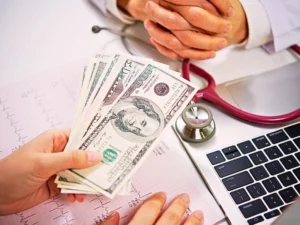Can You File Bankruptcy on Medical Bills?
Can you file bankruptcy on medical bills? You can get medical bills discharged if you file Chapter 7 or Chapter 13 bankruptcy. Mounting medical bills are one of the reasons people file for bankruptcy. Medical bills might be the least of your worries when you seriously require medical treatment. You usually prioritize your recovery and overall physical well-being. Medical costs, however, can dent your financial well-being and expose you to additional stress.
The good thing is that you can discharge or eliminate unpaid medical bills by declaring bankruptcy. There is a catch, however. Medical bankruptcy does not exist under bankruptcy laws. You can only wipe out medical debt through the usual bankruptcy proceedings. A
Is Medical Debt Dischargeable in Bankruptcy?
A bankruptcy proceeding cannot eliminate a priority debt. Priority debts include certain income taxes, spousal maintenance, child support, and criminal fines. There is no way around priority debts – you must fulfill your financial obligations. You risk losing your collateral if you default on a secured debt, such as a car loan or mortgage.
Filing bankruptcy will significantly impact your credit ratings for several years. This consideration applies even if your main goal for declaring bankruptcy is to take care of unpaid
During the bankruptcy filing process, you must provide documentation of all your debts, assets, and expenses. Some examples of crucial bankruptcy documents include basic personal information, bank statements, income documentation, real estate, car titles, a list of assets, and evidence of credit counseling. The court will review these documents to determine the next course of action.
You can address your overwhelming medical debt by either filing Chapter 7 or Chapter 13 bankruptcy. The two bankruptcy processes are different, as you will see in the sections below.
Chapter 7 Bankruptcy and Medical Debt
Filing a chapter 7 bankruptcy will help you discharge all of your medical debt. This bankruptcy type does not cap the amount of medical debt on your credit cards amount that you can discharge. It also does not include a repayment plan to clear the debts.
You must satisfy the requirements of a Chapter 7 Means Test to be eligible for Chapter 7 bankruptcy. The test compares your earnings to your state’s average income. It also compares your income to your necessary expenditures and debts to assess your ability to pay down debt.
You can move forward with Chapter 7 bankruptcy if your monthly earnings are below your state’s median income and are inadequate to pay expenses and debts.
Priority debts, like child support and tax bills, are not dischargeable under Chapter 7 bankruptcy. You will still have to meet your health insurance costs during the bankruptcy process. A bankruptcy court may sometimes authorize wage garnishment from your income to repay debts and other expenses that are non-dischargeable under Chapter 7.
Note that some of your assets may be auctioned to pay your creditors during a Chapter 7 proceeding. Although exemptions exist, a Chapter 7 process can result in property loss. The entire process takes about 4 to 6 months. Once the bankruptcy process ends, the court will discharge or forgive your qualifying debts.
A Chapter 7 bankruptcy will reflect on your credit report for at least ten years. A bankruptcy on your report can keep you from qualifying for loans or even negotiating for better rates and terms.
A bankruptcy lawyer who has handled such cases before can help you understand
Chapter 13 Bankruptcy and Medical Debt
A Chapter 13 bankruptcy considers your total debt, disposable income, and list of assets. It then formulates a court-ordered repayment plan for some or the whole total debt, including your outstanding medical costs.
The repayment plan is often in monthly payments that are 15% (or less) of your monthly disposable income. Chapter 13 requires you to pay your bills and make monthly installments to your creditors on time. Failure to meet any of these obligations will automatically lead to disqualification.
Unlike Chapter 7, this bankruptcy type has a debt limit. The limit amounts change every few years. The
Provided your debt is below this limit, you can initiate a Chapter 13 proceeding and get a large percentage of your medical debt discharged. Doing this will ease the financial pressure, allowing you to repay only a fraction of your debt.
The bankruptcy process, for instance, may dismiss 75% of the total debt, leaving you to repay only 25%. The percentage will vary with your total debt, monthly disposable income, and your state’s bankruptcy court.
A Chapter 13 bankruptcy takes longer than a Chapter 7 to resolve. A Chapter 13 proceeding typically takes three to five years to end.
Are You Overwhelmed by Medical Debts?
Medical bills can sometimes overwhelm you, even with health insurance coverage. This is especially true if you sustain serious injuries in a car crash. The cost of treating these injuries can cause your medical bills to multiply quickly. The medical bills arising from your accident-related injuries may even exhaust your medical coverage and push you into more debt. A
Your lawyer can review your situation to tell you whether declaring bankruptcy is the best decision. If so, the lawyer will help you decide between Chapter 7 and Chapter 13, depending on your situation. The lawyer will also explain what happens at each stage of the bankruptcy proceeding and specific challenges or risks in your case.
Besides preparing and filing your paperwork, your lawyer will also represent you at compulsory bankruptcy hearings. The lawyer will also deal with debt collection agencies, saving from their calls and intimidation.
Alternative Ways to Reduce or Pay Off Your Medical Debt
Consider other options before bowing to the pressure of your medical bills and filing bankruptcy. Upon receiving your medical bills, for instance, go through them carefully. Be sure to check for any billing mistakes or inappropriate charges. If you have a health insurance plan, confirm your provider has covered all eligible expenses. If not, submit proof to your provider of covered expenses that are unpaid.
A bankruptcy lawyer can help you assess your options for repaying debt, including negotiating with medical providers and other creditors. Many medical providers have generous repayment plans. However, a bankruptcy lawyer can also quickly determine whether your best option for relief is bankruptcy.





